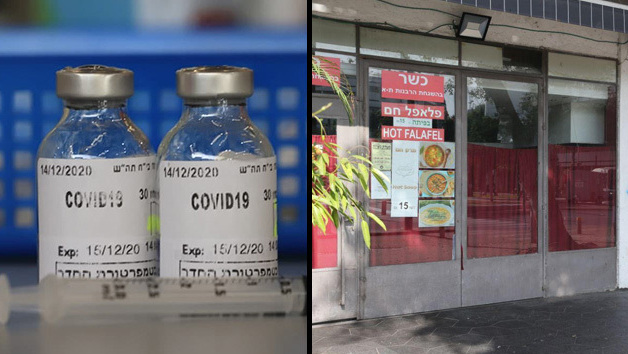


Corona vaccines are already here – but is Israel on the way to restrictions?
(Photo: Moti Kimhi, Eitan Elhadz TPS)
At the same time, tonight the map of the localities was updated in accordance with the traffic light plan – which indicates the orange and red localities in which students in fifth grades and above will not return to classes in classes this coming Sunday.


Will be vaccinated on Saturday – and will discuss restrictions on Sunday. Netanyahu
(Photo: Itai Ben On, GPO)
Therefore, the Corona Cabinet will convene on Sunday to discuss the return of some of the restrictions on the economy. It is estimated that the ministry’s representatives will recommend approving the implementation of the program as soon as Israel reaches a weekly average of more than 2,500 infected per week, or a coefficient of infection of 1.32 (ie – one person infects 1.32 people.
The Ministry of Health estimates that next Tuesday Israel will reach an average of 2,500 infections per week – and then the restrictions will be applied: Closing of trade, malls, markets and street shops; Closing of schools in the red and orange cities (excluding kindergartens), reducing public transportation to 50% and closing businesses with public reception. The Ministry of Health will recommend leaving open businesses that work in a one-on-one format – for example, books and cosmetics salons. In this scenario, street shops are expected to close again.


A stubborn battle is expected in the cabinet. Katz with Ganz
(Photo: Amit Shabi)


Dr. Elrai-Price warns, Tuesday
(Photo: Gil Yohanan, Shachar Goldstein)
However, the Ministry of Health expects opposition in the cabinet from Finance Minister Israel Katz and the ministers of the Blue and White Bloc – who are planning a stubborn battle in the cabinet. “It is not possible for the government to automatically approve the closure of trade in Israel, causing unemployment to hundreds of thousands of people and the collapse of tens of thousands of businesses,” said Science Minister Yizhar Shai. “With all due respect to the numbers, the Cabinet and the government must discuss the issue of restrictions in light of changing circumstances and in particular vaccines.”
Defense Minister Bnei Gantz also demanded that the cabinet’s decisions not be implemented, such as increasing the fines delayed by Netanyahu for more than a month. His critics claim that this is due to fear of the ultra-Orthodox.
“The scope of vaccines and their expected impact on morbidity levels is a critical factor in making decisions that will affect the Israeli economy and the livelihoods of millions,” Ganz said today. “We would like to receive all the relevant information before convening the Cabinet, and only then will we formulate our position regarding the required restrictions.” He and Katz held a consultation, at the end of which they agreed to formulate a position in accordance with the morbidity, mortality data and also subject to the presentation of the vaccination program and its expected effect. ”


“The rise in morbidity among the ultra-Orthodox public is gaining momentum.” Bnei Brak, November
(Photo: Bnei Brak News)
Despite the demand of blue and white ministers to consider exacerbating the restrictions in the shadow of the changing reality following the start of the vaccination campaign, the Ministry of Health warns that complacency should not be allowed. “It will take between five weeks and two to three months until we start to see the effect of the vaccines,” they estimate. “This is because there is a three-week gap between the first and second vaccines, and you have to wait another week after the second vaccine for it to have maximum effect.”
The Ministry of Health hopes that the tight restraint, which is intended for three weeks, together with the effect of the vaccines, will be able to prevent a general closure. However, cabinet ministers are convinced that the tight restraint will not really help enough and fear that in a few weeks Israel will be forced, for the third time, to enter a general closure.
She clarified that all the neighborhoods in Jerusalem are defined as “red,” noting that in the past week the rate of tests in the ultra-Orthodox sector was the lowest, while the rate of positive tests was the second largest – after the Arab sector.
Data uploaded this morning by Prof. Eran Segal of the Weizmann Institute showed a similar trend: “The ultra-Orthodox are leading the rate of increase – 127% this week, doubling every six days,” he wrote on his Twitter. He added that the number of patients is increasing in all sectors and that the virus is spreading. According to him, differential actions will no longer suffice.
Meanwhile, data from the Ministry of Health on the overall morbidity rate show that 2,288 Israelis have been diagnosed with coronary heart disease since midnight. A total of about 64,000 tests were solved and the positive rate was 3.6%. 709 corona patients are hospitalized in hospitals across the country, 413 of them in critical condition. 3,050 corona patients have died since the outbreak, 12 of them today.
High morbidity has also been recorded in recent days in several Arab localities, some of which have already been closed. The Ministry of Health wrote a document to the ministers of the committee declaring restricted areas, stating that in 14 Arab localities that were closed, there was no change in the numbers of those infected, and the situation even worsened in some of them. In six localities, on the other hand, the differential closure proved its effectiveness.
According to the document, in Nazareth, which entered the closure on November 21 and left on December 4, the number of weekly infections on the day it closed was 263, while at the end of the closure the number of weekly infections was 322. Five days later there was a slight decrease in the number of weekly infections. About 291.
Another example presented at the office comes from the town of Qalansawa in the Triangle, where there were 54 weekly contagions on the day of the closure. On the day of the closure, there were 24 infections per week, but five days after the closure – the number jumped to 62 infections per week with a positive testing rate of 11%, as opposed to 5% five days earlier.
In Iksal in the north, a locality of about 15,000 residents, the number of people infected per week on the day it entered the closure was 15, and at the end of the closure was 24, with 5.8% of the tests that were positive. Five days later, the weekly number of infections soared to 62, with a positive testing rate of 11%.

